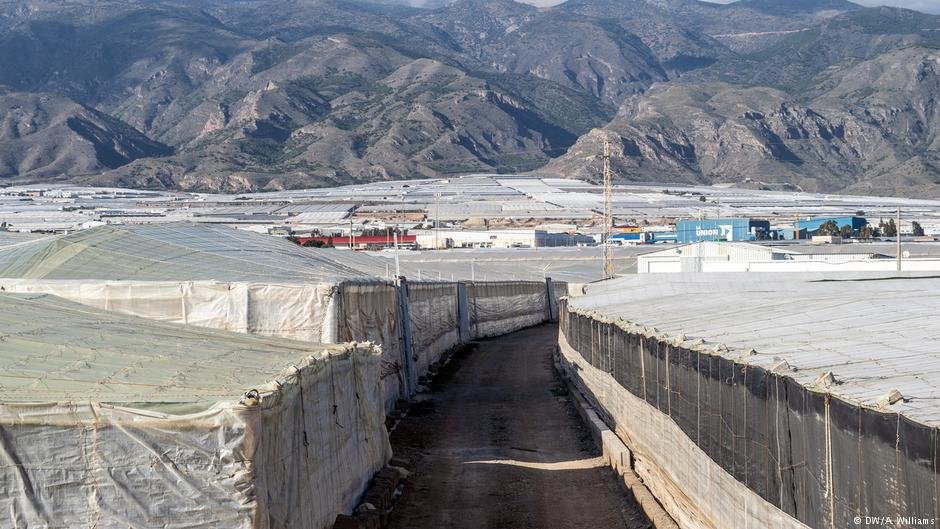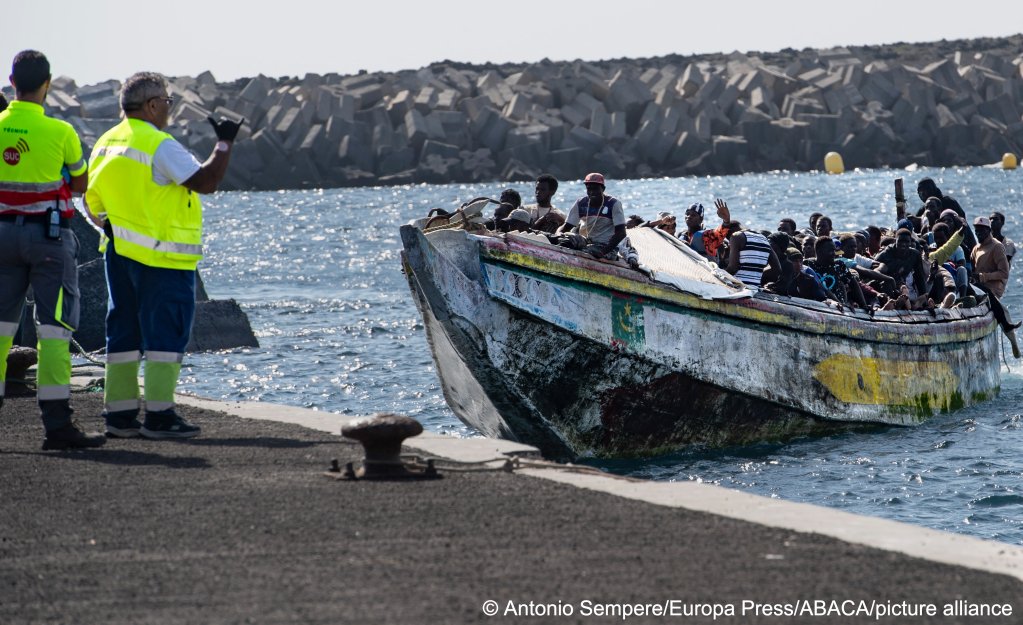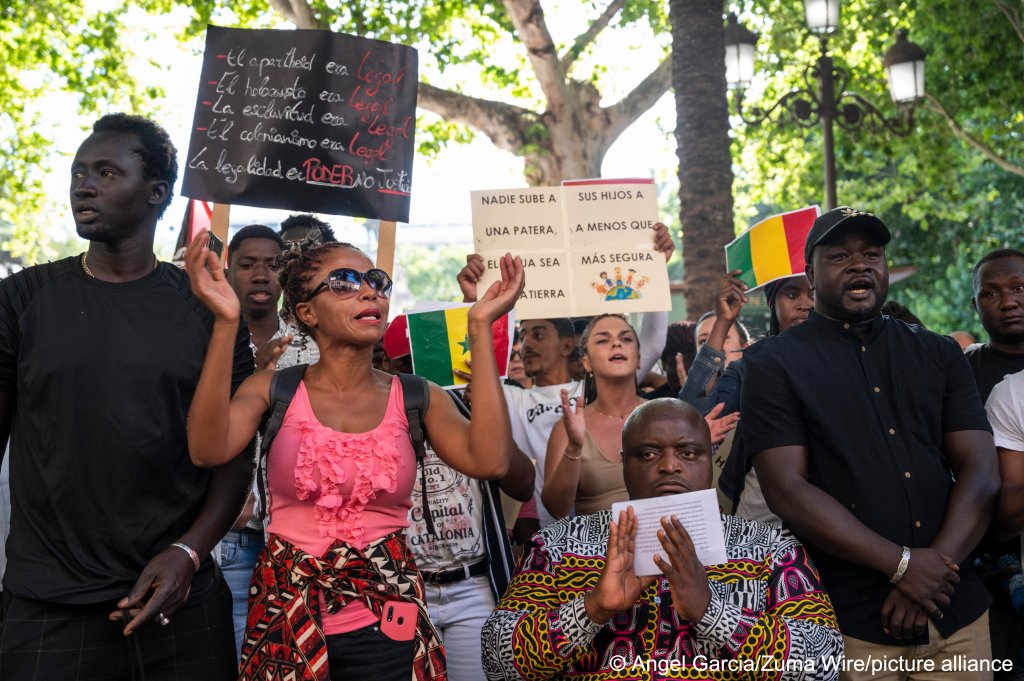In an address to parliament, Pedro Sanchez said migrants help to drive the economy and that successful management of migration is the key.
"Spain needs to choose between being an open and prosperous country or a closed-off, poor country," said Spain’s Prime Minister Pedro Sanchez in a speech in parliament on Wednesday (October 9).
The Spanish leader appears to be singing from a very different political hymnbook from much of the rest of Europe, whose leaders have been advocating tougher policies, increased border controls and an increase in returns and deportations.
Instead, Sanchez said that he believed migration was not just a question of humanity, but the only realistic means of growing an economy and sustaining the welfare state. In short, Spain, with one of the lowest birthrates in Europe, needs more migrant workers to keep going.
Read AlsoCanary Islands: EU to allocate funds to support hosting of migrants
Migration as a 'driver for development'
"Throughout history, migration has been one of the great drivers of the development of nations, while hatred and xenophobia have been – and continue to be – the greatest destroyer of nations. The key is in managing it well," said Sanchez, according to a report in Britain’s Guardian newspaper.
In the speech, Sanchez promised that he would push funding towards better integrating migrants into the labor market and reduce bureaucracy surrounding residency applications. The news agency Reuters reported that he also intends to recognize academic qualifications for temporary workers and simplify contracts as part of a new labor migration program.
The prime minister has acknowledged that even low skilled migrants working in sectors like agriculture, construction and hospitality help the economy.

"Almost half of our municipalities are at risk of depopulation. We have elderly people who need a caregiver and can’t find one," declared Sanchez, according to the Guardian. "Companies that are looking for programmers, technicians, bricklayers and cannot find them. Rural schools that need children so that they don’t have to close their doors."
According to the international economic cooperation and development policy organization OECD, Spain is projected to grow 1.8 percent in 2024 and 2 percent in 2025. "Population ageing, sluggish productivity growth and low investment weigh on Spain’s growth potential," wrote the OECD in a country assessment report in May this year. "Boosting growth and productivity requires greater innovation, improving skills, and enhancing education outcomes along with ensuring an effective implementation of the RTRP (Recovery, Transformation and Resilience Plan)."
Poll suggests migrants associated with 'negative concepts'
In recent years, the majority of migrants arriving in Spain have traveled via the Atlantic route from the coast of West Africa to the Canary Islands. Sanchez also acknowledged the "humanity" shown by people on the Canary Islands towards survivors of the dangerous journey to their archipelago.
A poll of 2,000 people published by the Spanish newspaper El País on October 8 gave similar, positive indications of attitudes towards migrants held by people who had contact with immigrants in their neighborhoods, at work or in a leisure environment.

The same poll showed that inflation, inequality and housing are the issues of greatest concern to Spanish people. However, it also suggested that a growing number of people who tend to vote on the right wing of politics see migration as a problem.
Asked whether they thought Spain had too few or too many migrants, more than half (57 percent) said that there were "too many," although 54 percent of citizens also overestimated the size of the immigrant population.
According to El País, three quarters (75%) associated migrants with "negative concepts" such as insecurity, strain on public services and resources, social conflict, crime and unemployment.
Read AlsoSpain's circular migration policy explained
Attitudes towards different 'types' of migrant
Almost a quarter of Spaniards surveyed believed that people from North Africa should not be allowed to migrate to Spain, and 60 percent said they should only be allowed "with limitations." Just 11 percent voted to allow migration from this region without any limitations.
Responses were similar when asked about migrants from sub-Saharan Africa. 17 percent of those surveyed believed migrants from that region should not be allowed in Spain, 64 percent said it could be allowed but with limitations and just 13 percent believed there should be no limitations on migration of people from that region.

Responses on immigrants from Latin America were most favorable, with just nine percent wanting this group blocked from entering Spain and 18 percent believing they could enter with no restrictions and 68 percent allowing for entry, but "with limitations."
When asked about people coming from northern, central and southern Europe, those polled were again more favorable, with no one saying this cohort should be blocked all together. 58 percent saying they could enter "with limitations" and 33 percent saying they could enter without limitations.
'Spaniards are the children of emigration'
Sanchez told parliament that Spanish people were the "children of emigration, we are not going to be the parents of xenophobia."
Warning against false stereotypes, he said 94 percent of migrants who had arrived in Spain had done so legally. About 40 percent of them were Latin Americans, 30 percent hailed from other parts of Europe and 20 percent were from Africa.
"We’re talking about a diverse migration flow that looks nothing like the image [perpetuated by] the far right," he said.

"I want citizens to understand that this is not a battle between Spaniards and foreigners, or Christians and Muslims or saints and criminals. It is a battle between truth and lies, between stories and data, between what is in the interests of our society and the interests of a few who see fear and hatred of foreigners as their only path to power."
Read AlsoSpain: Prime Minister Sanchez in Canary Islands as migrant reception crisis worsens
Calls for faster implementation of EU migration pact
Sanchez' government has faced heavy criticism from parties in opposition. The conservative PP party says his policy for the Canary Islands is not strong enough, accusing him of allowing more people to die trying to cross the sea.
However, the prime minister did say that the EU needed to manage its borders more carefully, and announced he would be calling on the EU to move forward the implementation of the new migration and asylum pact from mid-2026, to mid-2025.
The pact has caused concern among human rights organizations, which say the increased use of detention and surveillance, as well as a reduction in procedural guarantees, among other issues, put the rights of asylum seekers at risk.
In addition, they argue that Spanish-led agreements with countries like Morocco and Mauritania, which have tightened those countries' controls and border management, have made journeys more dangerous by blocking routes across the Mediterranean from North Africa, causing migrants to attempt the Atlantic crossing instead.
With Reuters and AFP
